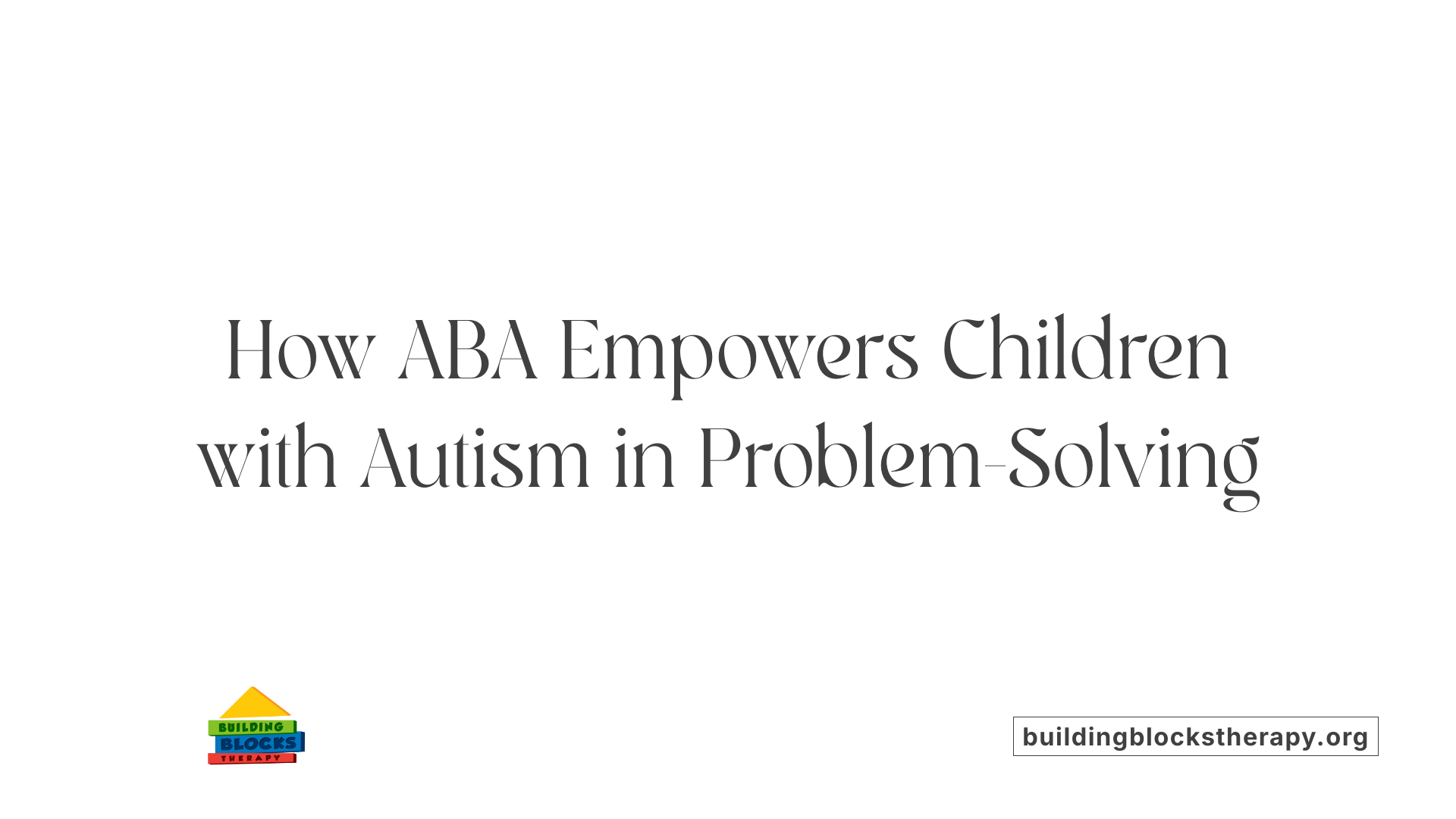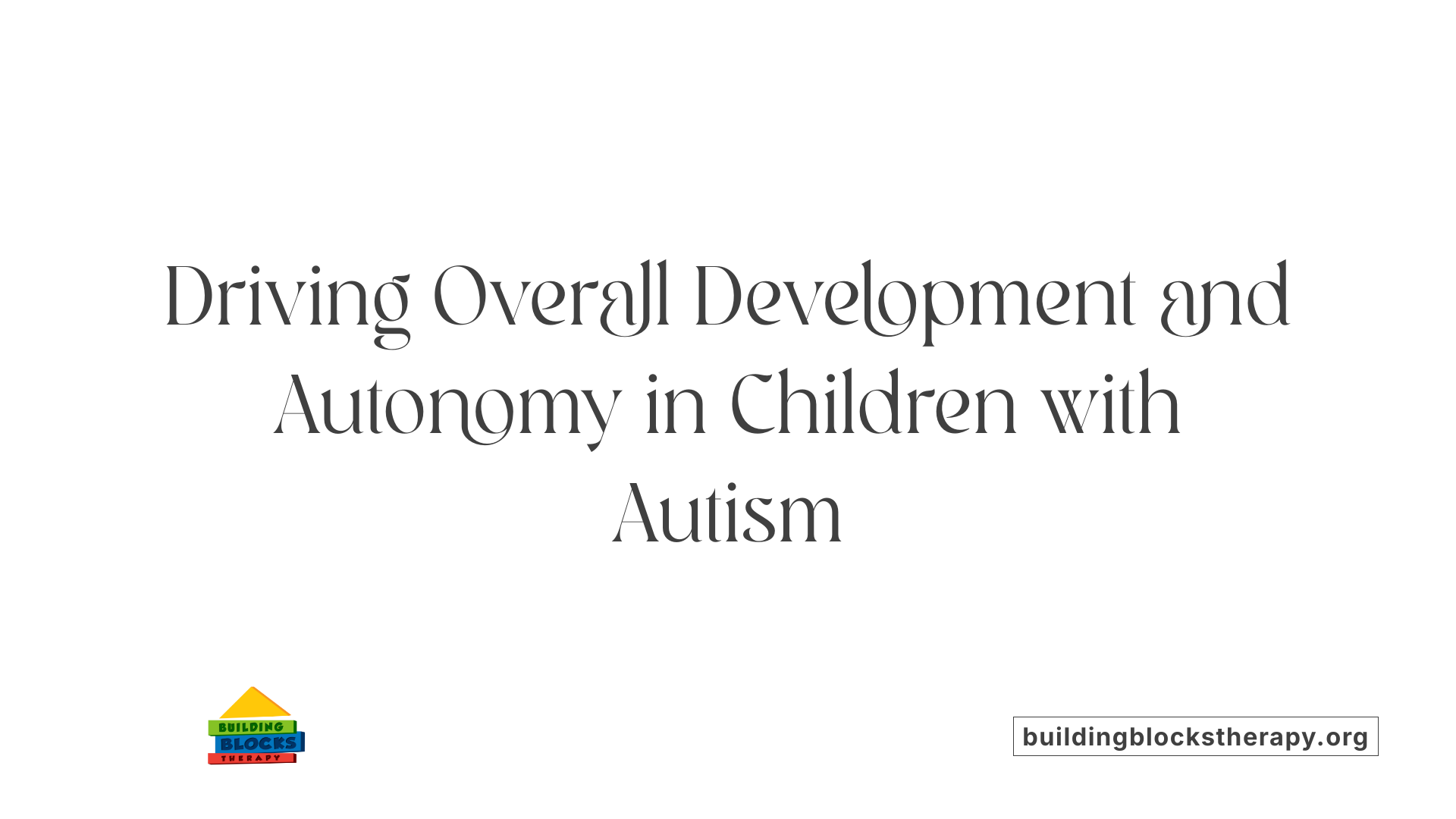Understanding the Power of ABA in Developing Problem-Solving Skills
Applied Behavior Analysis (ABA) stands as a scientifically supported intervention that significantly enhances problem-solving abilities in children with autism. By leveraging evidence-based techniques, tailored programs, and early intervention strategies, ABA helps children develop essential cognitive, social, and independence skills, laying a strong foundation for lifelong success.
Core Principles and Techniques of ABA

How does ABA therapy support problem-solving development in children with autism?
ABA therapy promotes problem-solving skills in children with autism by breaking complex tasks into manageable steps through a process called task analysis. Therapists use structured interventions, such as role-playing and social skills training, to help children recognize social cues, communicate, and resolve conflicts effectively. Positive reinforcement motivates children to attempt and succeed at solving problems, encouraging independence. Data collection and ongoing assessments enable therapists to tailor interventions, monitor progress, and ensure skills are generalized across different settings like home, school, and community. As a result, children develop cognitive flexibility, adaptive behaviors, and social functioning, which are essential for daily problem-solving.
What are the benefits of ABA therapy for developing problem-solving and executive functioning skills?
ABA therapy offers notable benefits in enhancing problem-solving and executive functioning in children with autism. It teaches children to interpret social and environmental cues, plan steps toward goals, and execute them effectively. Techniques such as Discrete Trial Training (DTT) and Pivotal Response Training (PRT) help children learn to break down tasks, control their impulses, and make decisions, strengthening their self-control and emotional regulation. Reinforcing progress and promoting skill generalization across settings increase their ability to apply learned problem-solving strategies in real-life situations, fostering greater independence. Overall, ABA supports long-term cognitive growth and the capacity to handle daily challenges more effectively.
How does early intervention and specific therapeutic techniques foster problem-solving skills in children with autism?
Early intervention utilizing ABA harnesses brain plasticity during critical developmental periods, setting a strong foundation for problem-solving. Techniques like role-playing, peer interactions, and natural environment teaching engage children in meaningful contexts, helping them learn and practice problem-solving strategies naturally. These approaches are tailored to each child's needs and involve collaboration among therapists, families, and specialists to ensure consistency. Early intervention not only improves language and social skills but also enhances cognitive development, enabling children to better understand and resolve daily challenges, which promotes greater independence and success later in life.
What methods and strategies are used in ABA therapy to develop problem-solving abilities?
ABA employs various methods to cultivate problem-solving skills. Task analysis breaks down complex skills into smaller steps, making learning manageable. Visual supports, like worksheets and social stories, aid understanding and execution of problem-solving strategies. Systematic modeling demonstrates how to approach challenges, followed by reinforcement to motivate children. Natural environment teaching and pivotal response training enable children to practice problem-solving in real-world situations, promoting generalization. Teaching children to recognize problems and report them helps foster active engagement. These strategies collectively aim to develop functional, adaptable problem-solving abilities that children can use across different contexts.
What research supports the effectiveness of ABA therapy in promoting problem-solving skills?
Research consistently confirms the positive impact of ABA therapy on problem-solving development in children with autism. Meta-analyses show moderate to high effectiveness in improving cognitive skills, including problem-solving, alongside social and adaptive behaviors. Techniques like Discrete Trial Training and Pivotal Response Training target specific cognitive processes, improving children’s ability to approach and resolve challenges. Studies involving natural environment training and task analysis demonstrate improved generalization of problem-solving skills in daily life. Overall, scientific evidence validates ABA as a proven method for fostering problem-solving and broad cognitive development in children with ASD.
How does ABA therapy contribute to the overall development and independence of children with autism?
ABA therapy advances children’s development by teaching critical skills such as communication, social interaction, and daily living. Through structured and data-driven approaches, it modifies behaviors, reduces problematic actions, and promotes positive routines. Personalized interventions, ongoing assessments, and caregiver involvement enhance effectiveness. Long-term participation in ABA results in improvements in language, cognition, social skills, and independence, allowing children with autism to navigate their environments more confidently. These skills foster meaningful participation in daily activities, leading to greater autonomy and quality of life.
How do structured play activities and interventions support problem-solving?
Play activities like puzzles, block building, and sharing toys are central to ABA interventions and serve as natural opportunities for problem-solving. These activities require planning, decision-making, and problem resolution, helping children practice skills in engaging, real-world contexts. Therapists design these exercises to reinforce cognitive flexibility and social understanding, encouraging children to approach challenges with confidence. By embedding problem-solving into playful scenarios, children develop essential skills that transfer to daily life, enhancing their ability to independently handle problems across settings.
What role do family and community environments play in generalizing problem-solving skills learned in ABA?
Family and community support are crucial for applying problem-solving skills outside therapy sessions. Consistent reinforcement across home, school, and community settings ensures that children internalize and generalize skills effectively. Parental training and collaboration empower families to implement strategies, while inclusive community environments provide diverse opportunities for practice. Routine reinforcement and familiar routines across different environments foster independence and confidence, helping children use their problem-solving skills reliably during everyday challenges.
Impact of ABA on Broader Developmental Outcomes

How does ABA therapy contribute to the overall development and independence of children with autism?
ABA therapy plays a vital role in helping children with autism become more independent by teaching essential skills like communication, social interaction, and daily living activities. Using proven strategies such as positive reinforcement, therapists break down complex skills into small, manageable steps and reinforce every success. This approach helps children learn new behaviors while reducing problematic ones.
Interventions are highly personalized, involving assessments and ongoing data collection to track progress. This data-driven process ensures that programs adapt to each child's evolving needs, maximizing developmental gains. As a result, children learn to navigate their environments more easily, perform daily routines independently, and engage confidently in social settings.
Research shows that consistent, long-term ABA therapy improves cognition, language, social skills, and adaptive behaviors. These improvements significantly enhance a child's ability to live more autonomous and fulfilling lives, providing them tools to handle everyday challenges and participate actively in their communities.
Fostering Long-Term Success through Tailored Interventions
In conclusion, ABA therapy is a comprehensive, evidence-based intervention that significantly advances problem-solving and cognitive skills in children with autism. Its individualized, structured approach, using proven techniques and early intervention, helps children develop independence and adapt to diverse environments. The integration of behavioral strategies, family involvement, and community support ensures that learned skills are generalized across settings, paving the way for long-term developmental success. As ongoing research continues to refine ABA practices, it remains the gold standard for supporting children with autism to navigate their world more effectively and confidently.
References
- Reasons Parents May Seek ABA for Their Child - TherapyWorks
- Applied Behavior Analysis in Children and Youth with Autism ...
- ABA Therapy and Play Skills: Building Foundations for Success
- How ABA Therapy Can Improve Your Child's Life
- Early Intervention: The Critical Role of ABA Therapy for Children ...
- What Makes ABA Therapy Effective for Children with Autism
- Child-Led ABA: A Fun Approach to Autism Therapy






